Peter MALONE
Saturday, 09 October 2021 13:01
Agatha Christie's Poirot Taken at the Flood
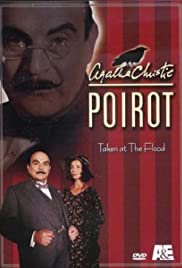
TAKEN AT THE FLOOD
UK, 2008, 93 minutes, Colour.
David Suchet, Jenny Agutter, Patrick Baladi, Eva Birthistle, Elliot Cowan, Amanda Douge, Penny Downie, Richard Durden, Claire Hackett, Richard Hope, Celia Imre, Nicholas Le Provost, Tim Piggott- Smith, Elizabeth Spriggs, Pip Torrens.
Directed by Andy Wilson.
The title takes its reference from Shakespeare and Julius Caesar, “there is a tide in the affairs of men that, taken at the flood, lead…�.
This is a story about a family, a very unpleasant family, seen initially all hurrying to a reception and a building exploding. There is an explanation about the background of the family, the dead man, his wife who had been previously married to an explorer who disappeared, her Svengali -like brother who controls her life, the various in-laws and spouses who all have their own agenda, especially concerning finance.
One of the characters has spent time in Africa and is in contact by letter with Poirot. He becomes involved in the case, commissioned to find the first husband, to see whether he was dead or had just disappeared and the second marriage was bigamy, with financial consequences for the rest of the family.
There are some deaths, but more than might have been anticipated at the beginning of the story.
There is a strong cast of British character actors, including Jenny Agutter and Celia Imrie as two sisters. And Tim Pigott Smith does a tour de force as an eccentric doctor. Even Birthistle is the young Irish wife and Amanda Doouge is the attractive woman from Africa.
It is rare to see Poirot so angry in the unmasking of the killer, but, more importantly, unmasking the evil presence behind the story as well as the condemnation of the selfish family.
1. The title? The quote from Julius Caesar? With relevance to whom? David Hunter?
2. The popularity of Agatha Christie mysteries, the television series, David Suchet as Poirot?
3. Poirot, ageing, manner of speaking, walking, touches of vanity? His involvement with people, his concern? The interviews, the case? His very strong condemnation of the family? Of David Hunter?
4. The background of the Cloade family? Gordon, his marrying Rosaleen? The family disapproval? Their all arriving and gossiping? The suddenness of the explosion? Rosaleen and David coming out of the fire?
5. The family situation, Jeremy and Frances, her father and his suspicious dealings, her brother Charles, Jeremy and the loss of money? Frances and her determination, talking with Rosaleen at the party, getting the cheque, the denunciation by David, a returning the cheque? Her desire for revenge? Using her brother? His impersonating the dead adventurer? His being murdered?
6. Lynn, vivacious, her time in Africa, letters from Poirot, the long friendship with Rowley, fiancee, the intention of marriage? Her meeting David Hunter, the immediate attraction? Her bewilderment, Hunter meeting her in the garden, the passionate moments, the alibi, Lynn and her discussions with Poirot, his urging her to the truth, her helping with Rosaleen after the suicide attempt, David Hunter’s behaviour? The meeting with Rowley, his anger, her leaving? The disillusionments David Hunter’s behaviour at the end?
7. Lynn’s mother, part of the family, her eccentric sister, Cathy, superstitions and alleged communications, or others…? Her abusive telephone calls to Rosaleen? Her fierce denunciations?
8. Her being married to the doctor, his mercenary approach, visitations, charging, over-charging? Mrs Leadbetter? With Rosaleen? The revelation about his morphine addiction, taking Rosalind’s morphine, as preventing her suicide?
9. Rosaleen, Irish, meek, her first marriage, the adventurer and his being lost? Her second marriage? Isolation, her dependence on David? The socials, wanting to lend the money? At home, the drugs? Her wanting to withdraw? The failed suicide attempt?
10. Enoch Arden, the literary echoes, his being seen, at the hotel, the landlady and her giving information to Rowley? Mrs Leadbetter and her seeing the woman with the scarf? The blackmail, confronting David Hunter, his death?
11. David Hunter, manner, Irish, arrogant, blunt in his plain speaking to everyone, the confrontation with Frances? Dominating Rosaleen? The attraction towards Lynn – and his double dealing? His spurning of the whole family? Going to visit Arden?
12. Poirot, his investigations, collaborating with the local police?
13. The finale, everybody present, Poirot and his indignation, different confrontations, especially with the doctor? The denunciation of the family and their hypocrisies? The revelation about the true Rosaeenl, David Hunter and his plan, his affair with the maid, Eileen? The death of his sister? The set up with Rosaleen? And setting her up for suicide?
14. Rowley and the revelation, his anger with Arden, hitting him, covering the fireplace, Poirot detecting the truth? Giving the money to the major, to witness in the court, the major’s suicide?
15. The complexities of the case, the complexities of the characters, and Poirot’s indignant denunciation?
Published in Movie Reviews
Published in
Movie Reviews
Saturday, 09 October 2021 13:01
Charlie Chan and the Chinese Cat
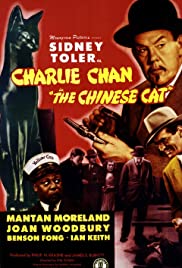
CHARLIE CHAN IN THE CHINESE CAT
US, 1944, 62 minutes, Black-and-white.
Sidney Toler, Joan Woodbury, Mantan Moreland, Benson Fong, Ian Keith.
Directed by Phil Rosen.
Despite the atmosphere of World War II, Sidney Toler and the makers of the Charlie Chan films were able to keep them popular during the first half of the 1940s.
The title refers to a statue of a Chinese cat which is present when a millionaire, chess player, is found murdered with his chess set. Later, the man’s wife wants to exhilarate herself from any accusation and joins forces with Charlie Chan who works with a rather ineffective policeman. He calls in his number three son, Benson Fong – and, his chauffeur, Birmingham, African-American? actor and comedian, Mantan Moreland, who is a strong screen presence but, in the light of later decades, many audiences are uneasy with his presence and performance and the racial overtones.
The solving of the mystery involves statues and jewels, some more murders, investigations and interrogations, and a climax in a funhouse.
CHARLIE CHAN FILMS
Charlie Chan was the creation of novelist Earl Deer Biggers, creator of the popular novel Seven Keys to Baldpate (adapted for the stage in the early 20th century and the plot of many films of the same name and variations). Biggers saw the beginning of the popularity of the films of Charlie Chan in the silent era but died at the age of 48 in 1933, just as the series with Warner Land was becoming more popular.
20th Century Fox was responsible for the early Charlie Chan films with Warner Oland and gave them more prestigious production values than many of the short supporting features of the time. After Oland’s death, Fox sold the franchise to Monogram Pictures with Sidney Toler in the central role. They were less impactful than the early films. There were some films later in the 1940s with Roland Winters in the central role.
The films generally ran for about 71 minutes, and similarities in plots, often a warning to Charlie Chan to leave a location, his staying when murders are committed, displaying his expertise in thinking through situations and clues. He generally collaborates with the local police who, sometimes seem, characters, but ultimately are on side.
Warner Oland was a Swedish actor who came with his family to the United States when he was a child. Some have commented that for his Chinese appearance he merely had to adjust his eyebrows and moustache to pass for Chinese – even in China where he was spoken to in Chinese. And the name, Charlie Chan, became a common place for reference to a Chinese. In retrospect there may have been some racial stereotype in his presentation but he is always respectful, honouring Chinese ancestors and traditions. Charlie Chan came from Honolulu.
Quite a number of the film is Keye Luke appeared as his son, very American, brash in intervening, make mistakes, full of American slang (and in Charlie Chan in Paris mangling French). Luke had an extensive career in Hollywood, his last film was in 1990 been Woody Allen’s Alice and the second Gremlins film.
Quite a number of character actors in Hollywood had roles in the Charlie Chan films, and there was a range of directors.
Oland had a portly figure and the screenplay makes reference to this. His diction is precise and much of the screenplay is in wise sayings, aphorisms, which are especially enhanced by the omission of “the� and “a� in delivery which makes them sound more telling and exotic.
There was a Charlie Chan film the late 1970s, Charlie Chan and the Dragon Queen with Peter Ustinov in the central role.
Published in Movie Reviews
Published in
Movie Reviews
Saturday, 09 October 2021 13:01
Who Killed Jeffrey Epstein?
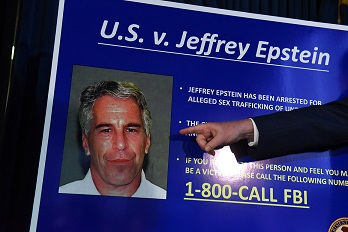
WHO KILLED JEFFREY EPSTEIN?
US, 2020, 150 minutes, Colour.
NB. Check Jeffrey Epstein: Filthy Rich.
Two documentaries about billionaire sex-offender, Jeffrey Epstein, appeared in 2020. The first was on Netflix, Jeffrey Epstein: Filthy Rich. The second is this one, highlighting the death of Epstein in the New York prison, the suspicious circumstances attending it, the possibility that it was murder and various conspiracy theories.
Quite a number of testimonies are given in both documentaries by a number of the same people. However, there is a larger selection in Filthy Rich, including quite a number of the young women who went to Epstein’s estate, allegedly for massage, became involved in his sexual activities, many of them brought in by Epstein’s companion, Ghislaine Maxwell, daughter of the British newspaper Baron, Robert Maxwell. (She has denied all charges – and has disappeared.).
The first film supplies more information than the second.
While Who Killed Jeffrey Epstein does trace Epstein’s origins, poverty, education, emerging conman -and narcissist, his career in business and out=manoeuvring partners, there is more background from Filthy Rich.
When the film focuses on the prison, his physical condition, the strange coincidence of the guards falling asleep, means for killing himself in his cell, there seems to be some basis for conspiracy theories. However, former prisoner and now guard, Bill Merswell, is of the opinion that it was a suicide. However, the main commentators in this film, a legal analyst who is in favour of the conspiracy to murder, a journalist who covered the events from the 2000s to his death, a journalist in criminal lawyer Prof, give the various angles.
48 hours before his death, Epstein changed his will to make it legally difficult for any kind of redress from his estate to be given to the women victims. Another point is that he could have been prepared to give up names and information of well-placed people and celebrities for bargaining and that he was killed…
Epstein’s life and career was certainly unsavoury, to say the least, but, his associations with celebrities like Bill Clinton, Bill Gates, Donald Trump, Prince Andrew (who does not come out very well from either film), Harvey Weinstein, means that it is a story in the public eye and, perhaps and unfortunately, symptomatic of society, sexuality and exploitation.
Published in Movie Reviews
Published in
Movie Reviews
Saturday, 09 October 2021 13:01
Crime Doctor's Courage, The
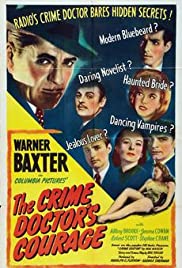
THE CRIME DOCTOR’S COURAGE
US, 1945, 70 minutes, Black and white.
Warner Baxter, Hilary Brooke, Jerome Cowan, Mark Roberts, Lloyd Corrigan, Emory Parnell, Stephen Crane, Anthony Caruso, Lupita Tovar.
Directed by George Sherman.
The Crime Dr series was very popular during the 1940s. It was based on a radio program.
Warner Baxter, Oscar-winner for in In Old Arizona, plays the doctor, a psychiatrist, who becomes involved in many mysteries and who has to do his own detective work.
The audience is introduced to a manic man on a cliff explaining that his first wife died in an accident and then his second wife falling to her death. His third wife, played by Hilary Brooke, approaches the doctor, inviting him to observe her husband. There is confrontation at the dinner, the husband confronted, his exit, his being shot.
The doctor has a novelist friend, played by Jerome Cowan, who takes him to see an exotic Spanish pair in their performance at a nightclub. It emerges that he is investigating them, about to expose them as vampires – but their living up to the publicity, sleeping in coffins…
There are more killings, including the novelist, and the doctor finally exposing the murderer.
1. The fourth in the Crime Doctor series? The popularity of the character, his origins, investigations?
2. The opening, Gordon Scott, manic, his wife, the clifftop, the story of the death of his first wife, his explanations, her fall?
3. Kathleen, encountering the doctor on his holiday, her story, marriage, Gordon, the invitation to dinner to observe? The servant, confronting Gordon, his exit? His murder?
4. Kathleen, her father and his leather making, the attraction to the dancer, her disappearance?
5. Jeff, writing novels, taking the doctor to the night club, the dancers, their performance, the disappearance with the bright light? Jeff’s apartment, his books and vampires, his encouraging the dancers to come to America, their routine being over 300 years old, in the old mansion, the huge box, the ropes, the explanation of their act? The suggestion they were vampires? The conference, the rescue, the truth? Janet death?
6. The waiter, not a waiter, the brother of the first wife, his charm, his vengeance?
7. The doctor, the investigations, the solution?
Published in Movie Reviews
Published in
Movie Reviews
Saturday, 09 October 2021 13:01
Just Before Dawn
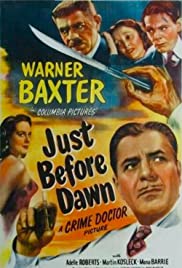
JUST BEFORE DAWN
US, 1946, 65 minutes, Black-and-white.
Warner Baxter, Adele Roberts, Martin Kosleck, Mona Barry, Martin Miller, Robert Barrat.
Directed by William Castle.
This is the seventh film in the Crime Doctor series with Warner Baxter. Baxter had won the Oscar for his role in In Old Arizona and had appeared in some prestige films including Adam Had Four Sons. However, for the rest of his career, he appeared in small budget films, achieving success and popularity with his Dr Robert Ordway.
This is a complex story, an initial murder, the audience having seen a sinister mortuary director and the substitution of poison for insulin in a diabetic injection. There is quite a range of suspects, Dr Ordway pursuing investigations along with the police because he had been called in to help the diabetic in his collapse but had, unknowingly, injected the poison.
There is a background to criminals, having plastic surgery on their faces, eliminating their fingerprints, all in connection with the mortuary. There are further deaths, the doctor being made up like a criminal to infiltrate the mortuary. There is an Agatha Christie-like gathering of everyone as suspects – and, one of the suspects being revealed as the sinister plastic surgeon.
Directed by William Castle who directed number of these films and was to go on to a range of B-budget experiments in horror films in the 1950s.
1. The Crime Doctor series? Mysteries? Detective work? The doctor as a psychiatrist? The development of the series?
2. The settings, the city, the doctor and his office, home, socials, the mortuary? The musical score?
3. The introduction, the insulin substitution? Ganss, the criminal and the substitution?
4. Dr Ordway, the invitation to the social, the collapse, the injection, the recovery, death? The reaction of the guests?
5. The inspector, the investigation, the autopsy and information? Dr Ordway and his investigation? Meeting the various suspects, the manager of the estate and his story, the possibility of greed? The real estate manager and the selling of the houses? The host couple, Walter and his flirtation, wanting money, the possibility of divorce? Claire, concern about her brother, his not allowing her to marry, the manager of the gym, her supplying the funds? The servant and suspicious?
6. Walter, the quotation about the face, the search in the Bible, Hamlet? Claire and her disappearance? The contact with Connie Day? At the mortuary? Her relationship with Walter, giving him information, blackmail? Her death?
7. The criminal, with Louie, the bond with the doctor, Louie shooting, the criminal throwing him out the window? Dr Ordway pretending to be blind? The interviews with the various suspects? The party and gathering together? Indicating that he was still suspicious?
8. Dr Ordway, the make up like the criminal, going to the mortuary? The criminal and their discussions, hearing the news? The threats, the police arriving? Free?
9. The confrontation with the estate agent, it emerging that he was the doctor, criminal, conducting all the plastic surgery for criminals?
Published in Movie Reviews
Published in
Movie Reviews
Saturday, 09 October 2021 13:01
Accomplice
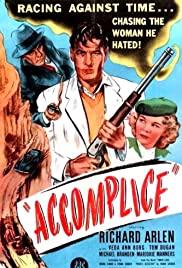
ACCOMPLICE
US, 1946, 68 minutes, Black-and-white.
Richard Arlen, Vida Ann Borg, Tom Dugan, Archie Twitchell, Marjorie Manners, Earle Hodgins, Francis Ford.
Directed by Walter Colmes.
This is very much a B-budget film. It has the touch of the film noir. It is also a story of a private eye.
Richard Arlen, veteran of such classics in the 1920s as Wings and The Virginian, is a private eye, with a strong reputation, working with an assistant, Tom Dugan, humorous and tough, engaged in doing all the footwork, is approached by a former girlfriend, Vida Ann Borg. Her husband is missing, claims of amnesia. He works at a bank, the detective approaches the head of the bank, discovers more suspicious information about the missing husband, his dealings in a mink farm, his setting up a girlfriend in a hotel apartment.
The wife of the missing man becomes more and more suspicious character, a blonde femme fatale. She identifies a dead body as her husband – but it turns out to be the head of the bank, the girlfriend also murdered.
The detective is under suspicion from the local sheriff. But he then goes on a trip to New Mexico, to an old ruined mansion, a scheme set up by two conmen, and a revelation that the husband is still alive, is working on a plot with his wife – and there is a final shootout.
A time-passer from the mid 1940s.
Published in Movie Reviews
Published in
Movie Reviews
Saturday, 09 October 2021 13:01
El Camino Christmas

EL CAMINO CHRISTMAS
US, 2017, 91 minutes, Colour.
Luke Grimes, Tim Allen, Dax Shepard, Kurtwood Smith, Vincent D’ Onofrio, Kimberly Flynn, Michelle Mylette, Jessica Alba, Jimmy O.Yang.
Directed by David Talbert.
El Camino has many connotations, the Spanish for road, the many Caminos in the United States, the Camino pilgrimage in Spain. And, when connected to Christmas?
While this is an American Christmas story, the links to Christmas are rather tenuous.
Rather, this is a story of a young man, Luke Grimes, coming to the town in search of his father. He is arrested because of drug possession, being confronted by the two police of the town, older and younger, as well as a whole range of oddball characters. There is also a pregnant television personality and her cameraman.
Some of enjoyed the film as being a satiric comedy. Others have not found it funny at all. So, with the general public, it is probably a bit hit and miss, hit or miss.
1. The title? Expectations? The Hispanic tone? The Western US States? The occasion of Christmas, Christmas story? The veering of expectations?
2. The opening, Christmas, the snow, the shooting, the two police officers and the threats? The screenplay going back 36 hours?
3. The introduction to the town, out in the desert, no snow for 40 years? Ordinary life in the town, Cooper and his drinking, police officer, lazy? His being reprimanded by his
superior? His being gunned happy? Deputy Fuller, earnest, slow off the mark, the sheriff as his patron, collaborating with Cooper?
4. This intake, the store, a gathering place, Kate helping out, her son and his not talking, the therapy session? Single mother? Her studying, able to fix the freezer? The Centre relying on her? The background of her mother, her father walking out, the mother wanting to be glamorous, the dates, to go bowling? The tension in the house, Kate not wanting her mother-to-be her mother? Taking the boys to the store?
5. Eric, his arrival, ordinary young man, looking in at the motel, his credit card not active, paying in cash? Suspicions? His going to the store, confronted by the police, Cooper telling him to get out? His going to the house, looking for his father, the encounter with Tim Roth, going for a drink, fights in the bar, money for the jukebox, the drinking? Roth not being helpful? Eric returning to the motel, trying to fix the toilet, the police, the planting of the drugs, accusations, arrest, the bashing is, in the cell? Billy, the key, leaving the cell open, urging Eric to escape?
6. Eric, getting his car, the previous comments by the police about the car, Cooper seeing him, the pursuit, shooting? Eric and his driving, Cooper and his crashing?
7. Eric, the return to the store, Roth and his going to the store to get the drink, This intake and his gift of the sixpack, Kate with her son? Cooper and his pursuit, shooting at the store, setting up the siege? Cooper being shot in the leg, in the store, his gun taken? His accusations? Roth and his reaction, taking charge?
8. Kate, her boy, Eric previously buying him a slice of cake, the gift of the truck, the explanation of the batteries? The long time? Food, drinking, singing Christmas carols?
9. The sheriff, Billy and his trying to be conscientious with the data? The puzzle? The siege, the TV interviewer, the sheriff being curt with her? The live feed going national? Calling the FBI and the troops, waiting?
10. Television, the pregnant interviewer, her assistant, filming the Christmas play? The siege, getting footage? The interview? Going national? The strong questions? The pregnancy, her giving birth?
11. The shooting beginning? This intake and his being wounded? Erich also shot?
12. Roth, the revelation of who he was, Erik discovering the truth, his reaction? His experience of his father? Roy, the story about Vietnam, his responsibilities, the deaths, the consequences, his abandoning his family? Sense of guilt? His decision to take the responsibility, going outside, the guns, his death?
13. Christmas, the snow, the pregnant reporter and the ambulance, Eric and the ambulance, descent a and he is worms?
14. Six months later, descent a and the payout, on holiday? Kate, her son, his having said thank you to Eric? Billy and his campaign for sheriff and the lady reporting the aliens? Eric arriving, the piece of cake…?
15. Not quite what was expected from the title?
Published in Movie Reviews
Published in
Movie Reviews
Saturday, 09 October 2021 13:01
Mordene I Kongo
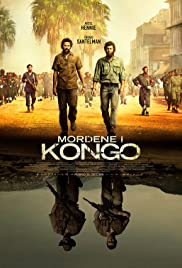
MURDER IN THE CONGO/ MORDENE I KONGO
Norway, 2018, 100 minutes, Colour.
Aksel Hennie, Tobias Santelmann.
Directed by Marius Holst.
This drama is based on actual characters and events, two Norwegians, mercenaries, friends, present in Africa, especially in the Democratic Republic of the Congo. They have been involved in various uprisings, in Uganda, in the Congo. They are ambushed at night, taken prisoner, kept in prison, a range of prisons, for quite some time, building up to court proceedings.
The film raised discussion in Norway, especially about the activities of the two men, their reputations, issues of justice – and discussions about the payments that the Norwegian government gave to the Congo.
The two actors provide strong performances, characters sometimes sympathetic, with visits from family from Norway, sometimes not sympathetic, clashes between them.
The film is interesting in terms of European- African relationships in postcolonial times, with memories of colonial oppression.
1. The title? Tone? Based on actual events? Events close to the making of the film?
2. Responses, especially in Norway, the critique of the characters, mercenaries, judgements on them? The responses from Congo and countries in Africa?
3. The locations, Uganda, the arrival, the countryside? The Congo, the terrain, the homes, villages, meetings? The ambush at night? The jungle action, the range of prisons and cells, the courts? The musical score?
4. African history, the movement towards independence, governments, war and rebellions, violence, issues of justice? Military, mercenaries, foreigners?
5. The introduction to 2 characters, Joshua and his explanation about being a mercenary, real men, action, their work in Africa, the plan for the visit, available, the contacts in Uganda, going to the Congo, the meetings, the money, the rendezvous, the bikes and truck, the designated driver? The ambush? The violence? The staging of the ambush – and the issue of who shot the driver? The authorities coming, their arresting the two?
6. The two men, the characters, friendship, bonds in the past, leadership? The guns, who did the shooting? The accusations against Moland? Joshua and his participation and support?
7. The presentation of the authorities, the violence, the squalor of the prisons, the range of prisoners, their activities, sport and the yards, the cells? The authorities and the looking down on the Europeans?
8. The years passing in prison, the use of flashbacks to fill out the background while the audience saw the men in prison? The toll of life in prison, Moland, his mental health, his behaviour in the court, defying? Medication, his illness? His hanging himself? Joshua, surviving, food, friends, becoming more emaciated, the beard, exercise? The interactions with Morland? The friendship, the difficulties, the behaviour in court?
9. Joshua, the range of lawyers and the interviews, men and women? The intervention of the Norwegian government? Moland and his thwarting the help? The behaviour in court? The visit of his mother, her staying in the Congo?
10. The effect on Joshua, the years passing, the interventions the government, his release and return to Norway? The information about the Norwegian money grants to the Congo and the reasons?
11. Audience interest in African stories – and the role of the mercenaries?
Published in Movie Reviews
Published in
Movie Reviews
Saturday, 09 October 2021 13:01
Last Days of American Crime, The
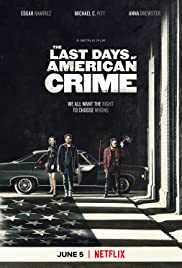
THE LAST DAYS OF AMERICAN CRIME
US, 2020, 148 minutes, Colour.
Edgar Ramirez, Anna Brewster, Michael Pitt, Charlotta Copley.
Directed by Olivier Megaton.
This is an original Netflix film, popular on first screening on the streaming network, then receiving completely negative reviews.
There is very little to commend in this film. It runs for almost 2 ½ hours, begins with bloodthirsty torture and killing, continues in this vein right throughout, building up to a brutal climax – but, the promise of some kind of hope as a vehicle travels through the beautiful TransCanada? Highway anticipating some kind of freedom and peace.
This can be called a very ugly film. The characters are in no way sympathetic – and many of them not particularly interesting. Edgar Ramirez plays a criminal, seen initially brutal, wanting to have one big robbery success. He encounters the son of a wealthy criminal, called Cash, and played by Michael Pitt. Also involved is a woman, caught up in the brutality, the sexual violence, played by Anna Brewster. A possible redeeming character is a policeman played by Sharlto Copley.
There is a futuristic core of plot, the American government and police tired of crime, announce that they will send out a radio wave which will affect people and prevent them from committing crimes. Television announcers keep reminding the public of the nearing deadline. In the meantime, there are riots on the street, social mayhem.
The film spends a lot of time showing the behaviour of its central characters, ugly and brutal, killings, vengeance, sexual assault.
The violence is built up between the two central characters, especially as the deadline draws near and some people, wanting to escape the US brainwashing, trying to move to the freedom of Canada. So is the central character, also involved in cash and robbery, fighting bloodily almost the end, driving across the bridge into Canada, and deadly experiences.
The film is based on a graphic novel and rather exploits the visual themes and imagery.
Published in Movie Reviews
Published in
Movie Reviews
Saturday, 09 October 2021 13:01
Burden

BURDEN
US, 2019, 117 minutes, Colour.
Garrett Hedlund, Forest Whitaker, Andrea Riseborough, Tom Wilkinson, Tess Harper, Crystal Fox, Usher Raymond.
Directed by Andrew Heckler.
The setting for this film is 1996, a small town in South Carolina. The film was produced in 2018 but had limited release – unfortunately. In the context of the upheaval in the United States with the death of George Floyd, the brutality of the police in Minneapolis, the consequent protest and riots throughout the United States – and protest beyond, mean that Burden’s release at this time is more than topical, extremely challenging.
The film is based on actual events. The main characters involved collaborated with the making of the film – even seeing it as an appeal for collaboration and contribution to in New Beginnings Ministry in the Laurens County.
For the outsider to the United States, it is something of a surprise to find that in 1996, citizens of this town are active members, proud members of the Ku Klux Klan. And, they are refurbishing an old cinema to become the Redneck Ku Klux Klan Museum, replete with all kinds of robes, instruments, weapons and Klan activity memorabilia.
At the centre of the demolition and rebuilding is a rather serious young man, not the brightest, past Army service and wounds, brought up in this town by a demanding father, expected to be a member of the Klan, participate in the activities, believe religiously, quoting the Scriptures and God’s will asserting the supremacy of the white race, despising the blacks, automatically using the derogatory “nigger�. And, there have been lynchings in the recent past, especially the uncle of the local Baptist pastor.
We might wonder where this is all leading. Much of the early part of the film shows the clan members, led by the local owner of a repossession business, Tom Griffin, played by British actor, Tom Wilkinson. He sees the young man, whose name is Michael Burden, as a surrogate son.
As the screenplay develops, it is comparatively low key, a small-town story, focusing on persons, personal relationships.
Michael encounters a young single mother, Judy (British actress Andrea Riseborough), with a son. Michael is attracted, setting up an emotional conflict as well as a conflict of loyalties to the Klan, to Judy and the care of her son. As the museum opens, the Minister, David Kennedy (Forest Whitaker) and the black citizens demonstrate outside, chanting, singing. While some of the young men of the town are eager to protest, the resort to violence, the Reverend Kennedy is very strong on non-violence and peace. At one stage, Tom Griffin urges Michael to go on to the roof of a store and shoot the Reverend Kennedy.
Garrett Hedlund’s performance as Michael Burden is well worth seeing, a nuanced performance.
There are some examples of outbreaks of violence, but the emphasis of this story is on redemption, the power of love, acknowledgement and confession, atonement, reconciliation. It is a challenge to Reverend Kennedy’s family, helping Michael in his dilemma, giving refuge to Judy and her son, practising what he preaches.
So, in fact, this is a faith film, an inspirational film, with pictures of Michael Burden and David Kennedy interspersed amongst the final credits.
This is a challenge reminder of deep-seated prejudices, extreme racism endorsed by an exclusivist interpretation of Christianity, the conflict between the supremacist theology and the Christian gospel of love and forgiveness.
1. The title? Literal meaning? Mike Burden? His being unburdened?
2. Based on a true story, the 1996 setting, South Carolina, its traditions, the white community, the black community, Ku Klux Klan and traditions, religious dimensions, interpretations of Scripture? Race and protest? The musical score? Songs? Hymns?
3. The film emerging as a faith film, the portrait of David Kennedy, of Mike Burden, of their interactions, collaboration? Images of church, prayer, Kennedy’s sermons, his gospel principles – in contrast with the scriptural supremacist and superiority interpretations about race?
4. The US and the traditions of the Ku Klux Klan, its history, ideology, violence, lynching, superiority, supremacist behaviour? Religious dimensions? Continued power in 1996?
5. Mike Burden story, Garrett Hedlund and his performance, his recounting his story, his treatment by his father, confronting the deer, inability to kill it, his father’s rebuke about not being manly? The Klan and his being brainwashed? The cult atmosphere of the Ku Klux Klan? His military service, his injuries, return home? The poor American male at the end of the 20th century? His age, life, not so bright, the domination of Tom Griffin, his friends and their behaviour, the demolishing of the cinema, the building of the Museum, his work in repossessing, the various pleas of those losing their possessions? His just doing his job? The interaction with Clarence, memories from school?
6. Tom Griffin, patriarchal, father figure for Mike, leading the Ku Klux Klan, his influence, conversations, home, the young men, the refurbishment of the cinema? The Redneck Ku Klux Klan Museum? The building, on the street, the extent of its contents, the opening? Loyalties to him? Hazel and her enthusiastic endorsement of the Museum, her pride?
7. Mike, the encounter with Judy, her work at the shop, the racial dispute and her stance? Single mother, love for Franklin? Clarence’s son and their playing together? Meeting Mike, the attraction, the dates, the two boys playing together, Mike taking them fishing, unsettling his prejudices?
8. David Kennedy, age and experience, influence in the town, in the American South? His faith, prayer, his gospel principles, nonviolence? His wife, the son at home? In the church, preaching? The scenes of prayer? Leading the protest? The meetings, the young men and their wanting action? The effect of the protests? The continuing effort? The violent responses?
9. The antagonism towards him, Tom Griffin wanting Mike to shoot him, Mike going on the roof, unable to shoot?
10. Mike, his change, hidebound and the difficulties in changing his attitudes? The influence of duty? His moving away from Tom Griffin, poverty, ousted from jobs, from homes, not able to get a job?
11. Kennedy taking in Mike after his begging on the street? His wife’s reaction, his sons, giving them the room?
12. Getting a new job, mixing with the workers, the effect, his suspicions, jealousy and the remarks about Judy, his fighting back, being called boy? Being fired?
13. His being challenged, by Judy, by himself, and the criticisms by Tom Griffin? The importance of the friendship with Clarence, with his son, solidarity?
14. His decision, talking with David Kennedy, changing his life, the need for confessing, the experience of baptism? Atonement? Judy and Franklin present to the baptism?
15. The final credits, the photos, the continued life story, Kennedy and Mike Burden working together, in the town, against the Museum? A faith film?
Published in Movie Reviews
Published in
Movie Reviews